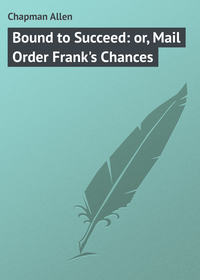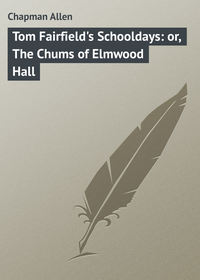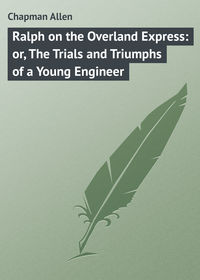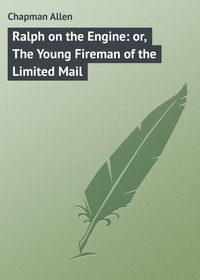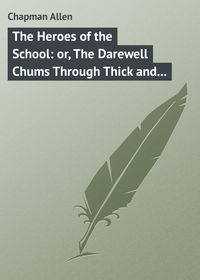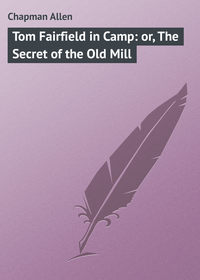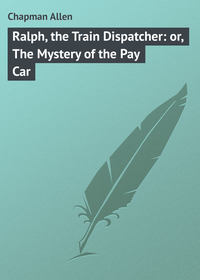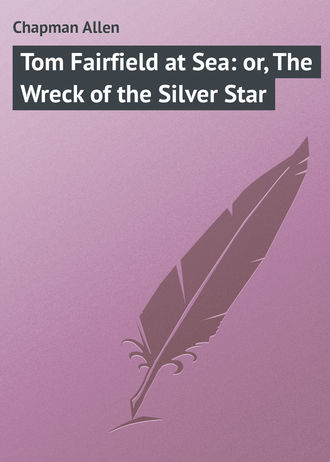 полная версия
полная версияTom Fairfield at Sea: or, The Wreck of the Silver Star

Allen Chapman
Tom Fairfield at Sea; or, The Wreck of the Silver Star
CHAPTER I
STARTLING NEWS
“Where to now, Jack?”
“Oh, I just thought I’d run into town and see what’s going on, Tom. Want to come along?”
“I’d like to – but this Latin – ”
“Oh, bother the Latin!” and Jack Fitch, the chum and roommate of Tom Fairfield, snatched the book from the scarcely resisting grasp of his friend. “Come along. You’re up well enough. Besides, we haven’t that old tyrant Skeel to deal with now in the classics.”
“That’s so. Guess I will go. Think it’ll be safe?”
“As safe as running the guard ever is, Tommy my boy,” and Jack assumed a wise air. “Probably there’ll be some of the proctor’s scouts out, but if we can’t fool ’em, after we’ve put in nearly a year at Elmwood Hall, I wouldn’t give much for our ability.”
“Right you are, Jack! Shall we tip off some of the others? Bert Wilson would like to come along, I know.”
“All right, I’ll give him the high sign. Shall we take the human question box?”
“Who, Georgie Abbot? Might as well. He isn’t as bad as he used to be, though he’s bad enough. Four will be just about right. Got anything special on, the reason you want to go to town?”
“No. But there’s a good musical comedy there, I hear.”
“How’s the weather? Is it raining yet?”
“Clear as a bell,” reported Jack, as he poked his head out of the window of their room. “Now I’ll take a look to see if the coast is clear, and get Bert and George while you put your collar on,” for Tom, to be at more ease while he was studying, had adopted a sort of negligee costume.
Gliding out into the hall, Jack knocked cautiously at the door of the adjoining room, giving a certain signal.
“Well?” whispered a voice at the keyhole.
“Come on into town, Bert,” whispered Jack in return, for caution was necessary, since it was past the hour for the Freshmen to go about as they pleased, to each other’s rooms, and long past the time when they might leave their dormitory without permission.
“What’s up?” asked Bert, as he opened his door a crack.
“Tom Fairfield and I are going to take in a show. I’ll get George, and we’ll have some fun. Cut down through the basement when you’re ready, and we’ll meet just outside the boiler room. Our studious janitor won’t give us away.”
“No, old Demy Miller will be so busy over his Latin or Greek, trying to be the king pin among studious janitors, that he won’t even see us. Go get ‘Why.’ I’ll be on hand in a minute.”
Jack glided to a room on the other side of his own and his chum’s, and repeated the tapping signal.
“Well?” queried George Abbot, otherwise ‘Why.’
“Come on to town?”
“What for? Who’s going? What are we going to do? Is it safe?”
“Say, if you fire any more questions at me,” whispered Jack hoarsely, “I know one lad who won’t be going, and that’s you, Why! Now hush up and come along. Tom, Bert and I are going to cut in.”
“All right, I’ll be with you directly.”
Jack glided back into his own apartment, and only just in time to escape the keen eyes of a patroling monitor. But he did get inside safely, and breathlessly.
“What’s up?” asked Tom.
“Denton-is-out-there. But I-guess he won’t stay-long.”
Cautious observations through the keyhole proclaimed this for a fact a little later, and soon Tom and Jack were tiptoeing down to the basement. There they met George and Bert, and the four were soon on their way to town, cutting across the campus in such a direction as to conceal their movements.
It was rather a cool evening toward the close of March, and there had been a drizzling rain all day. Now it had cleared, coming off cold, and Jack, realizing this had felt a restlessness that could not be satisfied unless he was doing something – something forbidden, by all preference.
Tom, Jack, and a number of their intimate friends were approaching the close of their Freshman year at Elmwood Hall. They had gone through the sports of the fall – football and the like, the Christmas vacation had come and gone, and now the Easter holiday was approaching.
When that was over the spring term would open – the closing term at the school – and Tom would soon be in line as a Sophomore. But much was to happen before he could count himself a second-year student.
“Think anyone will catch us?” asked George Abbot, who never could seem to stop asking questions.
“What if they do, you old interrogation point?” inquired Tom.
“Nothing, only I don’t want to be expelled just when the Freshman year is so nearly over.”
“Don’t worry. Just trust to me,” spoke Jack. “I’m running this outfit, and we’re not going to be caught.”
“There’s someone now – just ahead of us!” suddenly exclaimed Bert, drawing back. The others instinctively paused.
“No danger!” called Tom, who was a little in advance of his chums. “It’s our friend Bennington.”
“Hello, Tom Fairfield!” greeted a voice out of the darkness. “Whither away?”
“Into town on a lark. Want to come along?”
“Thanks, no. Remember I’m a grave and reverend Senior, and not a giddy Freshman like yourself. I have a reputation to maintain, and I can’t afford to take any chances with my graduation in prospect. I’d like to though. I’ll see that you get in safely, however, in case there’s any danger.”
“Thanks,” called our hero, Tom, as he and his chums passed on, while Bruce Bennington, a Senior whom Tom had aided in a peculiar way during the former term, headed toward Elmwood Hall.
“He’s a great chap,” commented Bert.
“He sure is,” agreed Jack. “And he’s a heap sight different than he was before Tom found the forged note that Skeel held over him.”
“I’m glad I was able to help him,” said Tom. “Come on, now, fellows, sprint for it. I think I hear a car coming.”
They broke into a run, and a little later had boarded an electric vehicle that ran near the preparatory school, and into the town of Elmwood proper.
“Look who’s here,” spoke Jack to Tom in a low voice, as they took their seats, and he nodded toward the far corner of the car.
“Who?” asked Tom, and then he added: “Oh, Sam Heller.”
“And Nick Johnson is with him,” went on Jack.
“Well, I guess they won’t make any trouble for us,” said Tom, for the two lads had been, and still were, his enemies.
“Unless they squeal on us,” suggested Bert Wilson.
“They’re just as much in the fire as we are,” protested Jack.
“They may have gotten permission to go to town,” came from George Abbot.
“Not much!” asserted Tom. “They cut for it the same as we did, and they won’t say anything.”
Sam Heller and his crony glanced over at our friends, but said nothing, and the car continued on its way. Soon it was in town, and Tom and his chums hurried to a theatre that the school boys patronized. They were a little late to see the start of the performance, but they did not mind that.
“Say, this is great!” exclaimed Bert as one “turn” after another was gone through with behind the footlights.
“Here comes a sleight-of-hand performer,” remarked Jack. “I always like to see them, even though I know they fake every trick.”
“Say! did you see that!” exclaimed George, as the man apparently picked cards out of mere air. “How does he do it?”
“Foolish question number eight hundred and forty-seven!” exclaimed Tom in a whisper. “If you ask three more you’ve reached your limit, and out you go!”
George subsided, and with the others watched the play, which was a sort of musical comedy, with vaudeville interspersed. The performance was over all too soon, and the boys started back toward school, after a round of sodas in a drug store.
“Well, we’ll soon be going home for the Easter vacation, and then the baseball season will open, when we get back,” spoke Jack. “Say, Tom, are you going to keep your promise, and spend Easter week with me?”
“Well, I don’t know, Jack. You see dad and mother wrote to me to go down in the country, and visit an old aunt of mine whom I haven’t seen for ages. I don’t see how I can make it to go to your place, much as I’d like it.”
“Are your folks still in Australia?” asked Bert.
“No, they’ve left there,” explained Tom. “They went there to look up some property a relative left to my father. They’ve been gone a long while now – at least it seems so to me, though the time has passed quickly enough while I’ve been here at Elmwood Hall.
“But I got a letter the other day, from dad, saying that the property matter was all settled satisfactorily, and that they had started for home.”
“Are they coming by way of Europe, as they planned?” asked Jack. “Cracky! Wouldn’t I like to see Europe, though!”
“No, they’ve changed their ideas,” replied Tom. “Dad and mother both thought they’d like a long voyage, so they took a large sailing vessel in the Australian trade that is to land them at San Francisco. Maybe I’ll go meet them if I can arrange it.”
“Coming on a sailing vessel; eh?” remarked Bert. “There aren’t many deep sea sailing ships any more.”
“No, and that’s one reason why dad wrote that he was taking the trip this way. He always has been fond of sailing and he thought he might not get another chance. So he and mother are on board the Kangaroo, somewhere out on the vasty deep at this moment – and I wish I was with them!”
Tom’s voice was a trifle husky, for he was a bit homesick for his parents, in spite of the good times he had had at Elmwood Hall.
Jack Fitch was looking over an evening paper he had purchased from a newsboy on coming out of the theatre.
“Anything interesting?” asked Bert.
“Not much. I was just glancing at the sporting page. I guess we’ll – ”
Jack suddenly paused, and stared intently at a certain item on the printed sheet. Then he asked in a curious voice:
“What did you say was the name of the ship your people were sailing in, Tom?”
“The Kangaroo. Why?”
“Oh, er – nothing. I – say – New York is going to have a crackerjack baseball team this spring, if their manager gets all the players he’s after!” and Jack tried suddenly to change the subject.
Tom Fairfield reached over and took the paper from his chum’s hand. Jack tried to hold it back.
“Why did you ask that question – about the name of the ship my father and mother are in?” asked our hero, and there was a catch in his voice, and his face was white. “Why did you? You saw something! Show it to me!” he demanded.
“No, it – it wasn’t anything!” protested Jack. “Just a rumor. You shouldn’t bother about it. Those things are never true – at least it’s not confirmed – and – Oh I say Tom, it isn’t really anything!”
“Let me see it!” cried Tom hoarsely, amid a silence in the car as it sped along. “You’re trying to hold something back from me, Jack. Is the Kangaroo wrecked?”
“No, nothing like that!” he answered eagerly. “There, if you’ve got to see it!” and he pointed to a cable dispatch in the paper.
With staring eyes Tom read:
“Sydney, N. S. W., March 25. – The steamer Bristol, which reached this port to-day reports passing at sea, a week ago, in lat. S. 21:14:38, long. 179:47:16, wreckage from some large sailing vessel. Part of a lifeboat picked up bore the letters ‘ngaroo.’ It is surmised that it belonged to the large sailing ship Kangaroo which left this port for San Francisco last week with a mixed cargo, and several passengers. Captain Ward, of the Bristol, reports encountering heavy weather before sighting the wreckage. He cruised about in the vicinity for half a day, but saw no signs of life, and no trace of the vessel. The underwriters have posted the Kangaroo.”
Tom read this once, and then over again. Then he stared at the paper, his face white and his hands trembling.
“Maybe it isn’t true,” suggested Jack gently. “And, even if there was a wreck, maybe your folks were saved. Maybe they changed their minds at the last minute and didn’t sail. I wouldn’t worry if I were you.”
“I – I can’t help it,” whispered Tom. “Dad and mother are – missing! This is bad news – bad news!”
Jack put his arm around his chum.
CHAPTER II
TOM TO THE RESCUE
While the car is speeding back to Elmwood Hall, bearing Tom and his chums, and while our hero is endeavoring to bear up under the strain of the unexpected and bad news that came to him, I will take the opportunity to tell you something more about him and his friends.
As related in the first book of this series, entitled “Tom Fairfield’s Schooldays,” the reason why he went to Elmwood Hall was because his father and mother had to go to Sydney, Australia, to settle some business affairs about a valuable property inheritance. They did not want to take Tom with them, and so break up his schooling, so they picked out Elmwood Hall for him to attend.
The same day that Tom received the news about going to boarding school and heard that his parents were to start on a long trip, he met Bruce Bennington, who had motored out to where Tom lived, in Briartown. Bruce borrowed Tom’s boat for a row, and Tom was at once struck with the air of trouble that brooded over the student – for Bruce let it be known that he was a Senior at Elmwood Hall.
A little later, Tom started for the place of learning. Almost at the outset he made an enemy of Sam Heller and his crony Nick Johnson. But our hero also made friends, his chief one being Jack Fitch, with whom he roomed in Opus Manor, the dormitory of the Freshmen.
Doctor Pliny Meredith was head master of Elmwood Hall, and among the teachers was Dr. Livingston Hammond, a stout, jolly gentleman, sometimes called the “Live Wire.” Doctor Meredith was known as “Merry,” because, as Jack Fitch said, “he was so solemn,” though not at all grim or forbidding.
There was also a certain Professor Burton Skeel, who was counted one of the most unpleasant of instructors. It was he who had made trouble for Bruce Bennington, in the matter of a forged promissory note, which threatened to ruin the career of the Senior.
But Tom was able to help Bruce in an unexpected way, and get possession of the note. The duplicity of Mr. Skeel was exposed, and he left Elmwood Hall. Not before, however, he had been the cause of considerable trouble.
His treatment of the students was so harsh that Tom proposed that they go on “strike” against him, and refuse to enter his class room. They did, Tom leading the revolt.
Our hero also led the escape from the school, when the whole Latin division of the Freshman class was made prisoners. The boys intended to desert to town, and stay there until Mr. Skeel was removed, but they lost their way in a storm, and had to come back.
Tom, however, had prepared an effigy of the unpopular instructor, and in the midst of a blinding snowstorm this effigy was burned on the flag pole, Mr. Skeel trying in vain to stop the student’s fun.
Thus the strike was broken, and Tom and his chums won, a new Latin instructor being engaged, and Doctor Meredith, though somewhat startled by the curious revolt in his school, managed to get material from it for a paper which he read before a very learned society.
But it was not all unpleasantness and strikes during Tom’s time at the school. He had spreads, he took part in a big football game, and made a sensational run, and he was champion of his class in the annual skating race, though Sam Heller tried to trip him.
Mr. and Mrs. Brokaw Fairfield, Tom’s parents, had remained in Australia ever since September, when they went there, to settle up the matter of the property that had been left to them. Tom had spent the between-term vacations with Jack Fitch, but the Easter one, his parents wrote him, they wished him to spend with an aged aunt.
“And – and, maybe that’s the last letter I’ll ever get from them,” thought our hero gloomily.
He was, as I have said, on his way back to the Hall from the theatrical performance, when Jack Fitch had unexpectedly come upon the item of bad news.
“Say, maybe this is nothing but a newspaper yarn,” suggested Bert Wilson, for want of something better to say, after a period of tense silence.
“I wish I could think so,” answered Tom gloomily. “But this paper is a reliable one, and that cablegram came by the Associated Press. That organization doesn’t send out false news very often.”
“But this may be just one of those occasions,” put in George. He was not asking questions now. He, as well as the others, wanted to do all they could for Tom, who was a general favorite in school.
“Well, of course, I’m going to hope so,” said our hero. “But that isn’t going to stop me from doing things.”
“What is your plan?” asked Jack.
“I don’t just know. I want to find out about the truth of this dispatch, if I can. I’m going to telegraph, or cablegraph – or – or, do something.”
“If we can do anything to help you, let us know,” suggested Bert.
“That’s right,” added George.
“My father has a lot to do with telegraph and cable companies,” said Jack. “He has a brokerage office in New York. Maybe he could get some information for you, by wire.”
“Perhaps he can,” agreed Tom. “I’ll ask him in the morning. Oh, I wish it was morning now!”
It was rather a dejected group of students who quietly made their way back into Elmwood Hall that night. Tom’s grief was like a pall over all of them, and they would not have greatly minded if they had been caught out after hours by some prowling monitor, or a late-staying professor.
But it was all too easy. They managed to get into the basement unobserved, and Demy, the friendly and studious janitor, let the boys into their corridor, whence they made their way to their rooms.
“By Jove, Tom, I wish I hadn’t bought that paper,” spoke Jack, as the two chums were getting ready for bed.
“Nonsense! It wasn’t your fault, Jack; I’d have known it sooner or later, and I’m glad to have it sooner. I can get busy quicker.”
“But even if the wreckage was found,” went on Tom’s chum, “that doesn’t say that the Kangaroo is lost. She may have been in a bad storm, and some of her lifeboats may have been carried away. Why even if badly damaged she could manage to keep afloat for a long time. A wooden ship isn’t like a steel one, you know.”
“I suppose not. I’ll hope for the best.”
“And I’ll wire to dad for you the first thing in the morning,” promised Jack.
Tom did not pass a very good night, sleeping only a little, and that restlessly, and he was up early. So was Jack, and at the suggestion of the latter they both obtained permission to go into town, and to absent themselves from lectures that day.
“Of course, my dear lads, of course!” exclaimed Doctor Meredith genially, when the case had been explained to him. “Do whatever you think necessary. And I will help you all I can. I sincerely trust that you will find the report unfounded, or, at least, that it is not as bad as it seems.”
“Say, he’s all right, if he is a head master; isn’t he?” asked Jack, as he and his chum were on their way to town, after an early breakfast ahead of their class.
“He sure is. Skeel was the only thorn here, and he’s gone; thank goodness!”
“I wonder where?”
“I don’t know. I heard he’d gone out west somewhere, changed his name, and was trying to get a berth in a new school.”
The two lads made their way to a telegraph office, and, explaining matters to the agent, he kindly offered to rush the messages for them. Jack sent one to his father, requesting an answer as soon as possible.
“Now we’ll have to wait a bit,” suggested Jack. “Come on for a walk around town.”
They were back at the office in a comparatively short time, however, and waited there while the instruments nervously clicked off their messages of cheer or sadness.
“Here comes one for you,” the operator suddenly said, and Tom stared at the affairs of brass and rubber, vainly wishing that he could understand the Morse code. Finally the agent handed over a moist slip.
“Sorry I have no good news for your chum,” Mr. Fitch wired his son. “Have communicated with Sydney agency and they confirm report. Kangaroo may not be lost, but she is missing. Can I do anything else?”
For a moment there was silence between Jack and Tom, and then the former said:
“Well, it isn’t as bad as it might be. Only missing. She may be afloat, and may limp into port. It will be hard waiting, though, for you, Tom.”
“But I’m not going to wait!” cried our hero.
“What?” asked Jack in surprise.
“I say I’m not going to wait for news. That’s the worst thing in the world – waiting.”
“But what are you going to do?”
“I’m going to the rescue!” exclaimed Tom. “I’m going to quit school, go to San Francisco, catch the first steamer I can for Australia, and hunt up dad and my mother.”
“Great!” cried Jack. “By Jove, I wish I could go with you! When are you going to start?”
“To-day, if I can get packed up. I’m off for Australia!”
CHAPTER III
A MYSTERIOUS PASSENGER
Tom’s sudden resolve came rather as a shock to his chum, Jack, and the latter, after his first expression of approval, began to wonder if the plan would prove practical.
“But how are you going to do it, Tom?” he asked. “Have you money enough to charter a steamer?”
“No, not exactly, though I guess I could raise it if I had to, for, since he got this Australian property, dad will have quite a fortune. But that won’t be necessary.”
“How else are you going to rescue them?”
“Well, I don’t exactly know,” admitted Tom frankly. “I just can’t wait quietly around here, doing nothing. I’m going to start for Australia, anyhow, and maybe some plan will come to me on the way.”
“But it seems to me,” insisted Jack, practically, “that you ought to have some definite plan.”
“Well, I have, part of one,” went on Tom. “I’m going to Sydney, unless I find them drifting around before I get there. I’ll pick out some steamer that will go as near as possible to the latitude and longitude mentioned in the dispatch, as being where the wreckage was picked up. Maybe I can induce the captain to cruise around there for a while, even if I have to pay for lost time.
“Anyhow, if I don’t locate them before, I’ll go on to Sydney, and there I’ll hire some sort of a vessel, and set out in search of my folks.”
“That sounds reasonable,” admitted Jack. “I only wish I could go with you. But I’m afraid my folks wouldn’t let me.”
“I wish you could go, too,” spoke Tom. “But I guess it’s out of the question. Besides, you’ve got your school career to think of. Leaving now, just before the spring term, might put you back, and you’d be a Freshman for two years.”
“I shouldn’t mind that. Still, I won’t think of going. But if I can do anything for you, don’t hesitate to let me know.”
“I won’t,” promised Tom, and then, when a telegram had been sent to Mr. Fitch, telling him of Tom’s resolution, the two boys returned to school. But it was not to resume study, for there was much to be done.
Tom at once told his plans to Doctor Meredith, and the head master agreed that Tom could scarcely do otherwise than go. He made arrangements to excuse him from his classes, and Jack began to help his chum to pack.
Word soon got around the Hall of Tom’s trouble and the fact that he was to leave at once was talked of on all sides. His room became a Mecca for fond friends, from every class in Elmwood Hall.
“By Jove, Tommy!” exclaimed Reddy Burke, one of the best athletes in the school. “It’s a crying shame to have you leave now, and the baseball season soon to start.”
“Well, I’ve just got to go,” insisted our hero.
“Oh, sure. Well, we’ll have a little celebration in your honor before you leave. Sure any lad that could get up a strike against Mr. Skeel deserves to have a gold medal. And I say, Tommy,” went on Reddy, “bring me back a pet snake, or a rabbit or something from Australia; will you?”
“I’ll try,” promised Tom, and he laughed a little – the first time since he had received the bad news, for Reddy was a jolly soul.
Tom found it impossible to leave that day, and that night, in spite of rules and regulations to the contrary, there was a spread in the room of Tom and Jack, and in the apartment of Bert Wilson, a communicating door being opened for the occasion.


